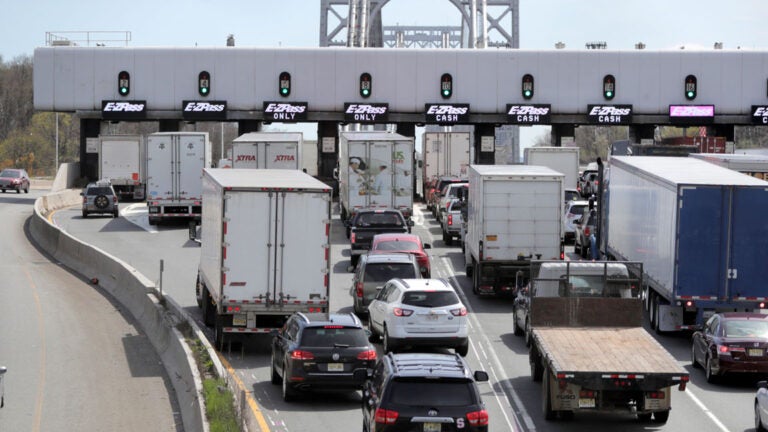New Jersey, other states pass on climate-change plan for transportation
The Transportation & Climate Initiative would cap emissions from cars, trucks and buses, but likely bump fuel prices by 5 cents a gallon.

In this file photo, cars and trucks line up at the entrance to the George Washington Bridge. (AP Photo/Julio Cortez)
This story originally appeared on NJ Spotlight.
___
A regional plan to reduce carbon pollution from vehicles is off to an inauspicious start with only a trio of states and the District of Columbia agreeing this week to take part while eight states, including New Jersey, are holding off on joining the collaboration.
The Transportation & Climate Initiative would establish a cap on greenhouse emissions from cars, trucks and buses and require fuel distributors to pay for the right to bring gasoline into the region, a step likely to increase pump prices by at least 5 cents a gallon. The money raised would fund cleaner transportation alternatives, such as public transit and transition to zero-emission vehicles in participating states.
Modeled after the Regional Greenhouse Gas Initiative, a program that has successfully curbed emissions from power plants, this latest regional collaboration is viewed by many as the most effective way to modernize and decarbonize the transportation sector, which contributes roughly 40% of all global-warming pollution in New Jersey and elsewhere in the mid-Atlantic region.
Initially, the initiative could reduce carbon pollution from vehicles by 23% by 2032 and yield up to $3 billion in annual public-health benefits if all states implement the program, advocates say.
“It will be a game-changer,’’ said Janet Coit, director of Rhode Island’s Department of Environmental Management.
TCI supporters tried to minimize the lack of enthusiasm, noting other states could come back to the table as Connecticut, Massachusetts and Rhode Island begin implementing the program.
“We expect our numbers to grow significantly,’’ said Kathleen Theoharides, secretary of the Massachusetts Executive Office of Energy and Environmental Affairs. Besides New Jersey, the other states that have talked for months about joining the initiative include Delaware, Maryland, New York, North Carolina, Pennsylvania, Vermont and Virginia.
N.J. ‘exploring the option’
In a statement from New Jersey Gov. Phil Murphy’s office, the state seems to remain committed to exploring the option of joining the regional initiative.
“With the majority of the state’s emissions coming from our transportation sector, we must focus on limiting the emissions through climate pollutant reduction regulations and investment in clean transportation,’’ said Alexandra Altman, deputy press secretary.
“While New Jersey will not be an initial signatory state in the TCI program, we will continue to evaluate its potential role in New Jersey’s climate change mitigation strategy,’’ she added.
In the statement, Murphy’s office signaled that it recognized opposition from environmental justice advocates who had lobbied the administration to reject the transportation initiative. They argued the cap-and-trade does little or nothing to mitigate pollution in communities with disproportionate impacts from poor air quality.
“TCI is broken,’’ said Maria Lopez-Nuñez, deputy director at the Ironbound Community Corporation, noting that fewer than a third of the states participating in the initiative signed up to implement the program. “Environmental justice communities are the canaries in the coal mine. It’s about time they started listening,’’ she said.
The TCI also took note of the opposition from those communities by including a commitment in the memorandum signed by the states and Washington D.C, to dedicate at least 35% of each jurisdiction’s proceeds — nearly $100 million annually — to those communities.
Monday’s announcement of the kickoff of the program comes at a time when the impacts of climate are being felt across the country, with communities overburdened with pollution impacts among the most vulnerable. Prolonged exposure to air pollution may make it more difficult to recover from diseases like COVID-19, according to a recent study by the Harvard School of Public Health.
‘80X50’
Reducing emissions from transportation is vital to reaching regional climate goals and doing so will also bring about direct health benefits, experts say. In New Jersey, the state Department of Environmental Protection released its “80X50” report in October urging significant strides to reduce emission trends from the transportation sector.
“Without a steadfast commitment to successive legislative, regulatory and policy actions that facilitate emission reductions over the next 30 years, New Jersey’s business-as-usual emissions are projected to be higher in 2050 than they are today — only 12% below 2006 levels, erasing progress over the last 15 years and missing the 80X50 goal,” the report said.
According to the state’s Global Warming Act, New Jersey needs to cut greenhouse gas emissions by 80% below 2006 levels by 2050, a key element of its climate reduction goals.
Proponents hailed Monday’s announcement of the kickoff of the regional program, no matter the number of states taking part.
“Today’s announcement is years in the making, and it has the potential to accelerate the region’s transition to clean, reliable and affordable transportation,’’ said Ken Kimmell, president of the Union of Concerned Scientist and a former commissioner of the Massachusetts Department of Environmental Protection.
WHYY is your source for fact-based, in-depth journalism and information. As a nonprofit organization, we rely on financial support from readers like you. Please give today.





